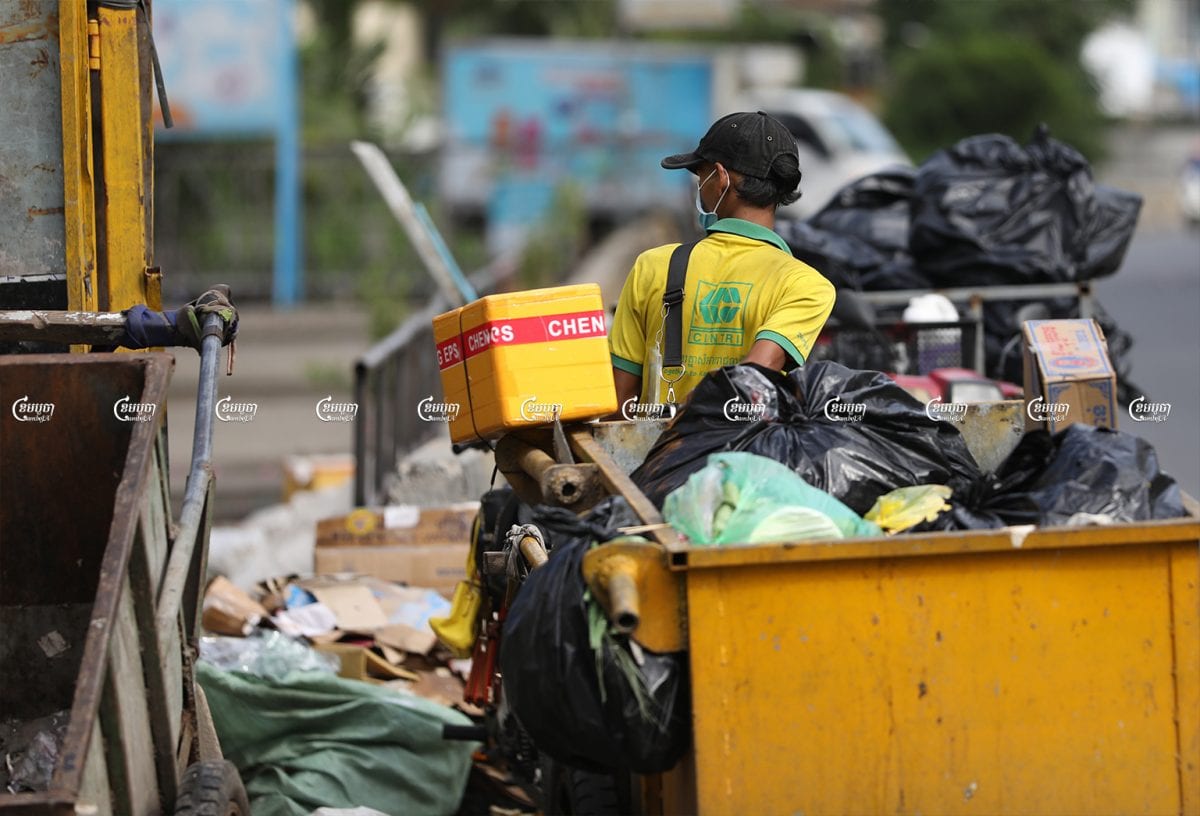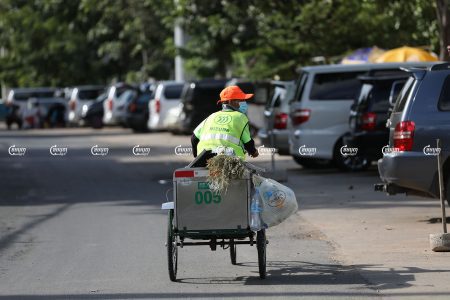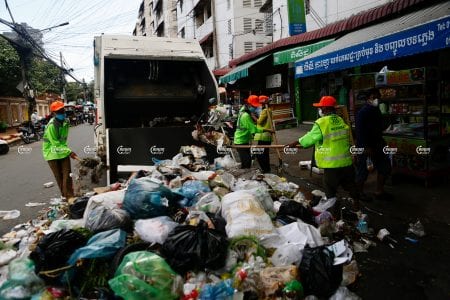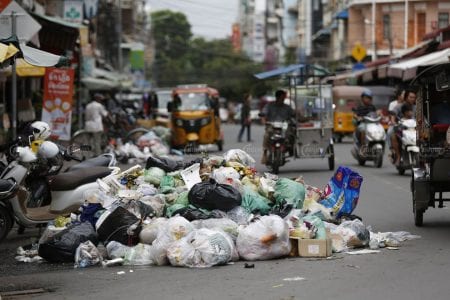Many of the 1,000-plus workers in Phnom Penh laid off last week from waste management company Cintri say the days since have been a struggle to find new jobs in the industry amidst what some say is discrimination against union members.
Chhun Ny is one of the workers who has faced difficulties after Cintri laid off about half its workforce on July 1. A 36-year-old truck driver formerly with Cintri, said he was hired at competing waste management firm 800 Super/Global Action for Environment Awareness after his layoff. That new job barely started before he was fired on July 2.
“I got a call from the company representative at 9 p.m. saying that I was fired and that they have accused me of being a union activist,” he said.
Ny told CamboJA he had worked at Cintri since 2006, first as a garbage collector before being promoted to driver in 2009. He said he had reapplied to work with Cintri but was told their rosters were already full. Ny is now applying with Mizuda Group, the third garbage collection firm now operating in Phnom Penh.
“I don’t believe that I have failed those companies because I have experience for many years in trash collection and truck driving,” he said, looking back on his recent troubles. “I am upset that they fired me without any reason.”
“They should recruit candidates based on experiences and knowledge, but they have discriminated against us and I am now jobless,” Ny added.
Cintri, working in partnership with a firm called Everbright, formerly had an exclusive contract to collect garbage in the capital but was regularly accused of poor service. The company was forced under state control in 2019, after which authorities revoked Cintri’s de-facto monopoly. Last year, city leaders divided Phnom Penh into three sections for garbage control and, after a bid process, issued new contracts to two additional companies, 800 Super and Mizuda, to handle solid waste.
Cintri’s sweeping layoffs came last week as its former territories were officially handed over to competing waste management firms. But while downsized workers had expected to directly transfer to these other companies, that process has not been so simple.
Ny says he’s now struggling to pay off a $10,000 bank loan in monthly installations of $349. Ny and his wife, who is a garment worker, are now wondering how they will support their young daughters.
“It’s very much affecting my family emotionally and in our living conditions,” he said. “My wife and I cannot sleep for these few days, because we are thinking about how to find money to pay the bank.”
Duong Silen, a Cintri executive administrator, declined to say specifically how many workers were laid off, stating the figure is not yet clear.
“Until now we cannot estimate how many workers, because they still have access to the company,” he said.
Silen said Cintri has already paid the workers their last monthly salary and is now processing their other benefits, which the company intends to pay on July 14.
In October, about 1,000 Cintri workers went on strike for four days to demand their benefits as municipal leaders reviewed their firm’s exclusive garbage collection contract for the capital. Workers were concerned the contract shuffle would cause Cintri to shut down without paying their benefits or final salaries. Their strike was highly visible, as it caused waste to pile up in the streets.
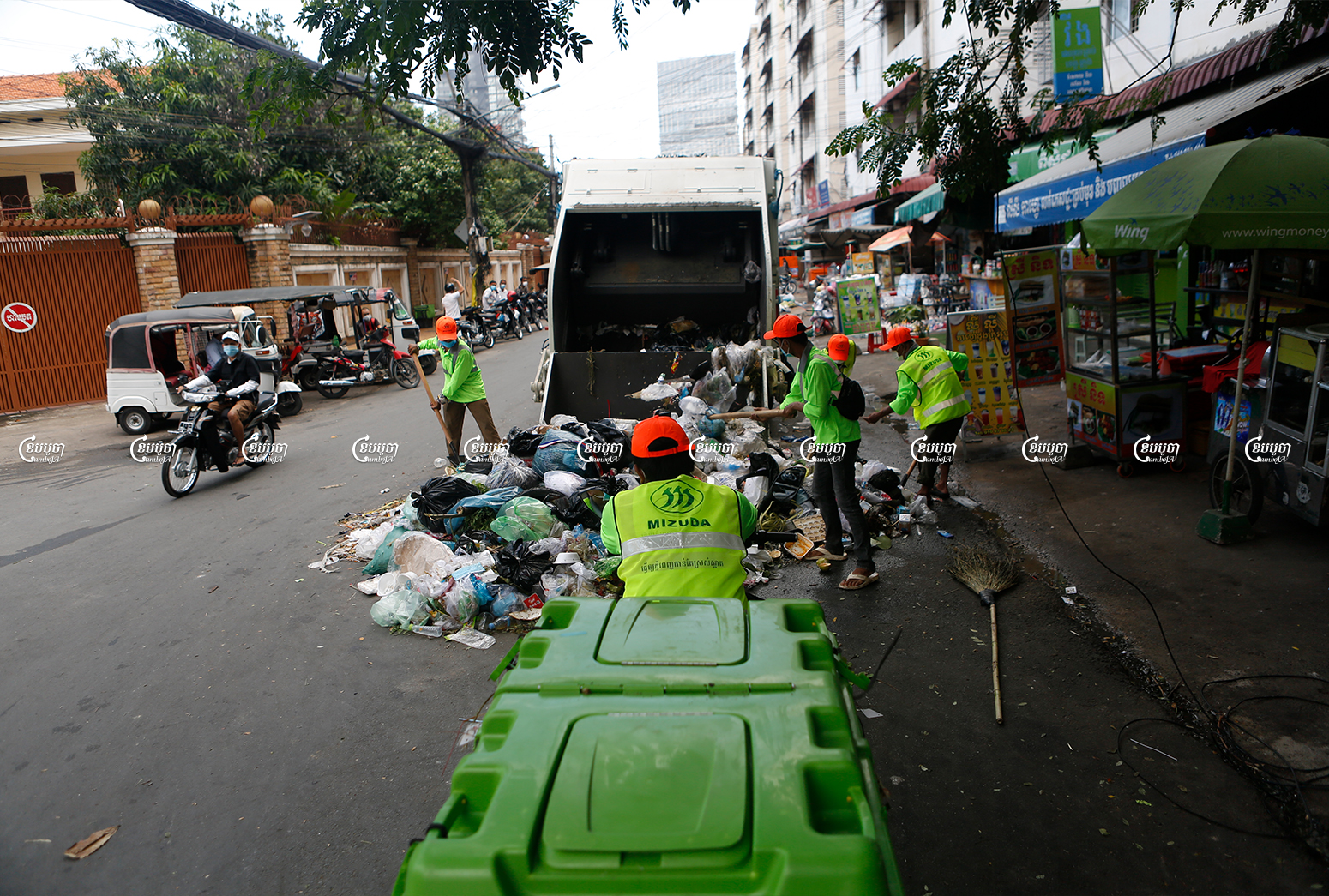
Kao Sovath, a former leader of the Cintri workers’ union, said the laid-off staff had previously been assigned to 10 districts that Cintri lost to other companies. Today, Cintri and Everbright only provide services in the city districts of Chamkar Mon, Boeung Keng Kang, Meanchey and Chbar Ampov.
Sovath said he was one of the 1,000-plus workers laid off. He is now waiting to receive other benefits from a transitional contract offered by Cintri in a compromise overseen by city leaders after the October strike.
Sovath emphasized that city authorities had told workers the restructure of waste management services would not leave them unemployed, instructing them to apply directly with new companies. Though public officials had told Cintri staff they would be priority candidates in that hiring process, Sovath said that has not prevented joblessness.
“I hope the Phnom Penh municipality will facilitate finding jobs for us,” he said. “Samdech Hun Sen said [he] wouldn’t allow workers to lose their jobs and if the new companies won the auction, the former workers would work there.”
A senior official from the city said he encouraged laid-off Cintri workers to apply for jobs with the new competitors.
“I have already told those companies that they need to accept applications from employees of Cintri,” he said, though he added that employers have their own criteria with which to hire workers.
Though a representative of Cintri’s remaining workers told CamboJA that conditions were more or less normal for those who had not been laid off, some employees who did manage to transfer to the newcomer firms say the transition has been difficult.
One worker now at 800 Super who requested anonymity complained of worse conditions at his new job compared to what he had at Cintri. He told CamboJA he had automatically been selected for his current position after his Cintri work zone had transferred with the waste management contracts.
“I used to have time to collect cans, bottles, and iron to sell, but now I have to collect two to three times per day with the 800-ton truck,” he said.
Chi Voon, who is listed online as the head of 800 Super’s human resource department, did not comment, stating he was too busy.
Seang Samuthmeas, a Mizuda representative, said his own company has faced some challenges regarding garbage congestion in the handover from Cintri.
“We have to expend our workers, time, trucks and whatever to collect all trash in the city. It is hard to collect on the first day, but we will try our best,” he said.
But Samuthmeas also said Mizuda’s hiring practices had been clean.
“We do not discriminate against any candidates because we want people to work and clean our city,” he said. “We have recruited based on job history, relevant documents and commitment.”
Samuthmeas told CamboJA that, as of today, the company had recruited 531 workers, more than 80 percent of whom came from Cintri.
Touch Kosal is president of the Cambodia Tourism Workers’ Union Federation, which oversees the Cintri union, said he is monitoring whether Cintri has properly paid benefits for those workers who were laid off.
“Despite Phnon Penh city [leaders] helping to facilitate, we remain concerned about discrimination of union members and activists,” he said, pointing out that some of the Cintri’s now-jobless workers may be the target of anti-union tactics.


